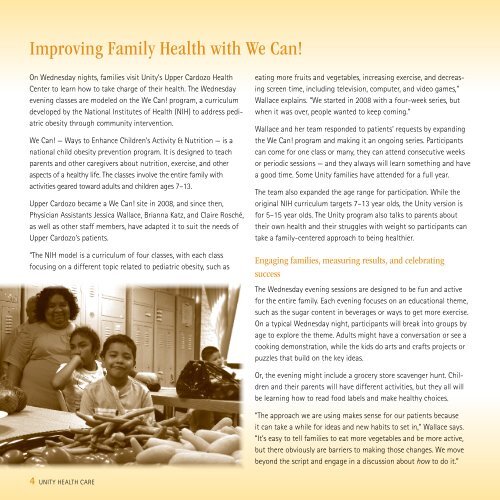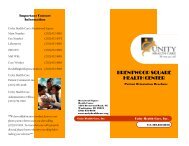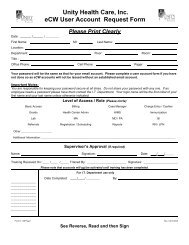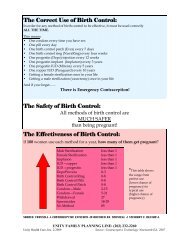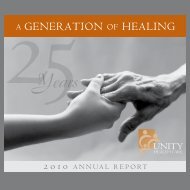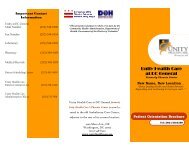A Cycle of Care - Unity Health Care
A Cycle of Care - Unity Health Care
A Cycle of Care - Unity Health Care
Create successful ePaper yourself
Turn your PDF publications into a flip-book with our unique Google optimized e-Paper software.
Improving Family <strong>Health</strong> with We Can!<br />
On Wednesday nights, families visit <strong>Unity</strong>’s Upper Cardozo <strong>Health</strong><br />
Center to learn how to take charge <strong>of</strong> their health. The Wednesday<br />
evening classes are modeled on the We Can! program, a curriculum<br />
developed by the National Institutes <strong>of</strong> <strong>Health</strong> (NIH) to address pediatric<br />
obesity through community intervention.<br />
We Can! — Ways to Enhance Children’s Activity & Nutrition — is a<br />
national child obesity prevention program. It is designed to teach<br />
parents and other caregivers about nutrition, exercise, and other<br />
aspects <strong>of</strong> a healthy life. The classes involve the entire family with<br />
activities geared toward adults and children ages 7–13.<br />
Upper Cardozo became a We Can! site in 2008, and since then,<br />
Physician Assistants Jessica Wallace, Brianna Katz, and Claire Rosché,<br />
as well as other staff members, have adapted it to suit the needs <strong>of</strong><br />
Upper Cardozo’s patients.<br />
“The NIH model is a curriculum <strong>of</strong> four classes, with each class<br />
focusing on a different topic related to pediatric obesity, such as<br />
eating more fruits and vegetables, increasing exercise, and decreasing<br />
screen time, including television, computer, and video games,”<br />
Wallace explains. “We started in 2008 with a four-week series, but<br />
when it was over, people wanted to keep coming.”<br />
Wallace and her team responded to patients’ requests by expanding<br />
the We Can! program and making it an ongoing series. Participants<br />
can come for one class or many, they can attend consecutive weeks<br />
or periodic sessions — and they always will learn something and have<br />
a good time. Some <strong>Unity</strong> families have attended for a full year.<br />
The team also expanded the age range for participation. While the<br />
original NIH curriculum targets 7–13 year olds, the <strong>Unity</strong> version is<br />
for 5–15 year olds. The <strong>Unity</strong> program also talks to parents about<br />
their own health and their struggles with weight so participants can<br />
take a family-centered approach to being healthier.<br />
Engaging families, measuring results, and celebrating<br />
success<br />
The Wednesday evening sessions are designed to be fun and active<br />
for the entire family. Each evening focuses on an educational theme,<br />
such as the sugar content in beverages or ways to get more exercise.<br />
On a typical Wednesday night, participants will break into groups by<br />
age to explore the theme. Adults might have a conversation or see a<br />
cooking demonstration, while the kids do arts and crafts projects or<br />
puzzles that build on the key ideas.<br />
Or, the evening might include a grocery store scavenger hunt. Children<br />
and their parents will have different activities, but they all will<br />
be learning how to read food labels and make healthy choices.<br />
“The approach we are using makes sense for our patients because<br />
it can take a while for ideas and new habits to set in,” Wallace says.<br />
“It’s easy to tell families to eat more vegetables and be more active,<br />
but there obviously are barriers to making those changes. We move<br />
beyond the script and engage in a discussion about how to do it.”<br />
4 unity health care


